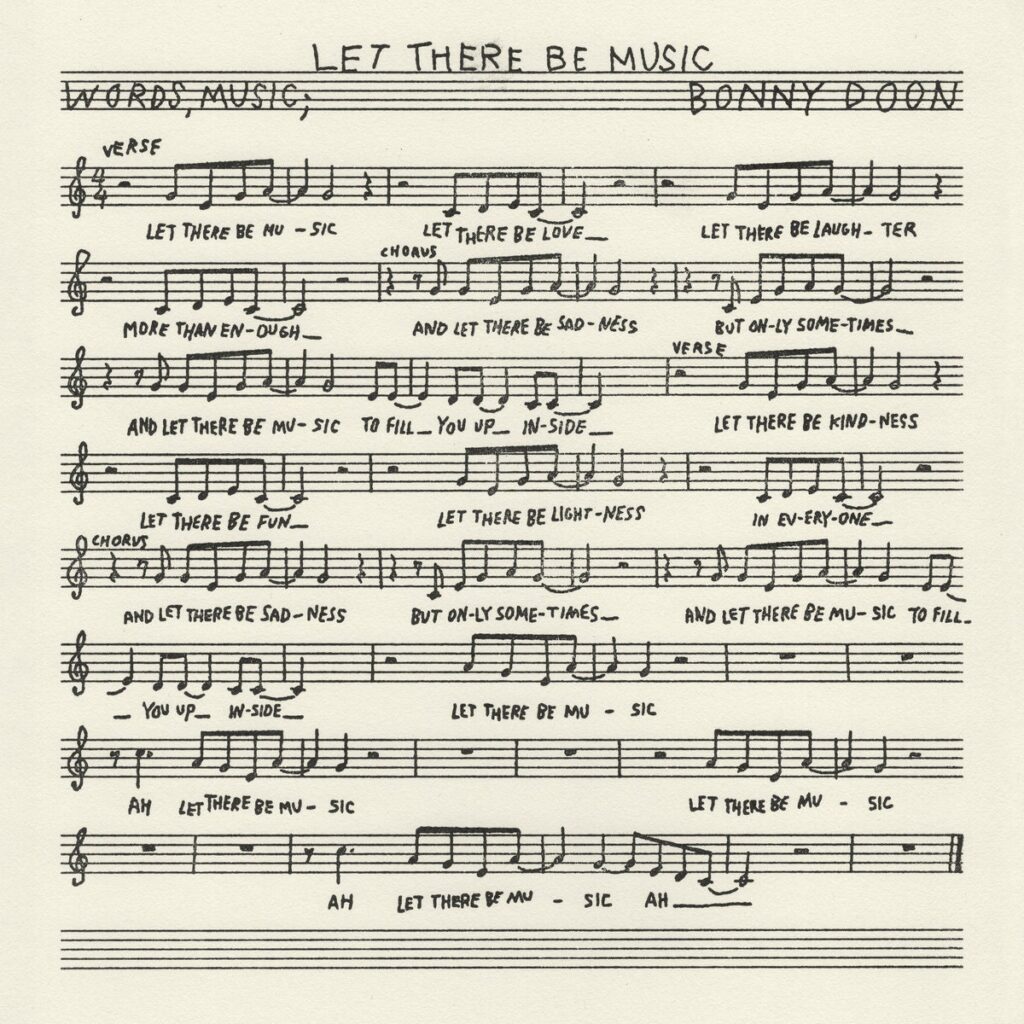Let There Be Music, the third album from Bonny Doon, feels as if it was created over the course of a few sunny afternoons. That carefree quality is an illusion: The Detroit band took the better part of five years to deliver the sequel to 2018’s Longwave, a slightly ragged collection of tenderly tuneful folk rock. In the meantime, the group endured a number of personal traumas. Bobby Colombo recovered from a brain injury and Lyme disease; drummer Jake Kmiecik experienced a worsening of Crohn’s, an autoimmune disorder.
A bright spot in this period was Bonny Doon’s steady gig with Waxahatchee. A longtime friend of the group, singer-songwriter Katie Crutchfield declared Longwave “my immediate favorite record” and recruited the trio as her backing band; then, after taking them out on the road, she had Bonny Doon play on her 2020 album Saint Cloud and accompanying tour. You can hear how that experience helped subtly sharpen the trio’s musicianship on Let There Be Music.
Bonny Doon remain anchored by the gentle, empathetic interplay of guitarists Colombo and Bill Lennox, yet they show less inclination to ramble than they did on Longwave. Quiet assurance and precise execution dictate the record’s shape and mood: Songs unfold at an unhurried pace, planting seeds that grow in the subconscious. Steering away from artisanal folk, Bonny Doon deftly expand their palette, moving closer toward pop. Piano plays a prominent role and drives the jaunty title track, reinforcing the impression that the group is drawing from a deep river of 1970s soft rock—artists like Harry Nilsson and Gilbert O’Sullivan, who themselves are tributaries of Paul McCartney.
Despite the laid-back vibe, Bonny Doon still prize subtlety. The mellow electric pianos on “Naturally” are mere coloring, highlighting the sun-kissed air of relaxation at the heart of the songs, as is the fuzztone guitar that weaves through the ramshackle “On My Mind.” They haven’t abandoned the folkier elements of their sound—“You Can’t Stay the Same” carries echoes of the Band’s rendition of “I Shall Be Released”—but it’s now one strand in a tapestry, not the main motif.
Apart from “Crooked Creek,” whose primitive thump and monotone melody suggest Maureen Tucker supporting Stephen Malkmus, Let There Be Music doesn’t particularly sound like indie rock, save for one factor: Both Lennox and Colombo sing with the deadpan delivery common among bands inspired by 1990s lo-fi rockers. There’s a crucial difference between that era’s slackers and this group, though: The trio’s flat affect never reads as irony. It’s earnest. At no point on Let There Be Music do Bonny Doon give the sense of looking askew at a subject—or themselves. Everything is presented at face value. On the album’s title track, they sing, simply: “Let there be love/Let there be laughter, more than enough.”
Such an embrace of positivity runs the risk of sounding saccharine, but Bonny Doon are saved by their modesty. They take no big swings on Let There Be Music, and they tackle no grand subjects; they merely concentrate on sculpting sweet, sincere songs about subjects like being vaguely homesick on a fine afternoon (“Fine Afternoon”), allowing emotions to evolve organically (“Naturally”), and trusting that hope will arrive as soon as today (“Maybe Today”). Each song is a carefully constructed miniature, and the album itself is endearingly small-scale too—a record where life lessons aren’t preached, just lived.
All products featured on Pitchfork are independently selected by our editors. However, when you buy something through our retail links, we may earn an affiliate commission.

